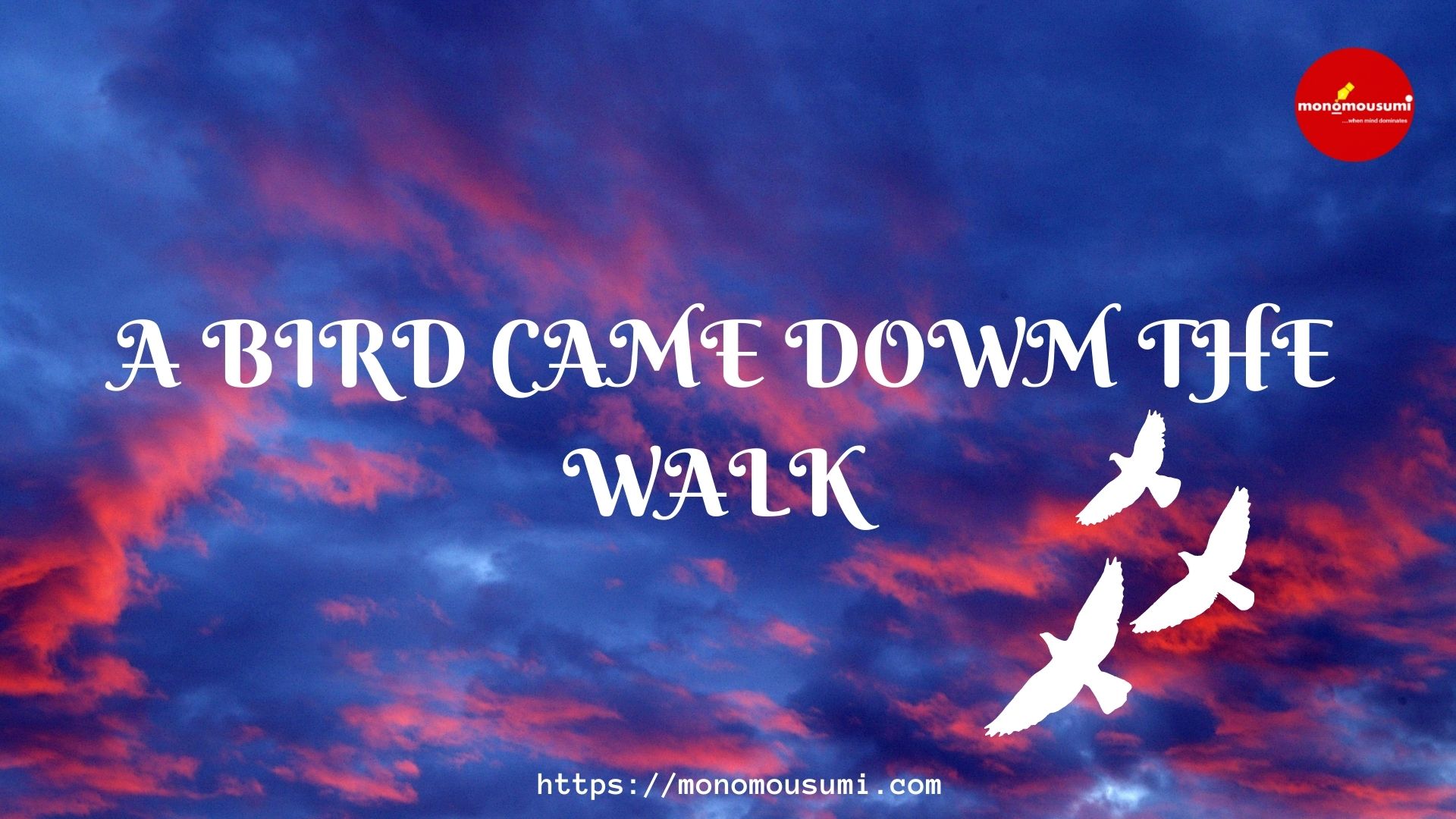
A bird came down the walk,
He did not know I saw;
He bit an angle worm in halves
And ate the fellow raw.
And then he drank a dew
From a convenient grass,
And then hopped sidewise to the wall
To let a beetle pass.
He glanced with rapid eyes
That hurried all abroad
They looked like frightened beads, I thought;
He stirred his velvet head.
Like one in danger; cautious,
I offered him a crumb,
And he unrolled his feathers
And rowed him softer home.
Than oars divide the ocean
Too silver for a seam,
Or butterflies, off banks of noon,
Leap plash less, as they swim.
Literary criticism
Nature is the most talented and precious artist in the world. So she can create her own needs by herself for survival. As well as she gives too much love, affection, and freedom to her inmates. So the Mother Nature is an independent artist. As well as her creature have their own personality to enjoy the needs given by nature. Even Mother Nature captivates our hearts and plunders our eyes with her extreme beauty. This idea is greatly illustrated by the poem, “A Bird Came Down the Walk” by Emily Dickinson.
The poem is based on a simple incident. The narrator observes a little bird coming down to the garden path. She observes the bird silently and the bird is unaware of her presence. The natural and spontaneous behavior of the bird is greatly tasted by the narrator. The delicacy of the bird’s actions is greatly captured by the poet. The little bird eats an angleworm, bit it in halves, and swallows it raw. This spontaneous and quick action of the bird manifests that the bird is a powerful and authoritative creature in its domain. As a complex human life, the little bird’s lifestyle is not complicated. It is a very simple and happy lifestyle. So he can enjoy his lifestyle without any obstacles. And also he has much freedom to walk, find his needs from anywhere he prefers. Ultimately it suggests the independence of nature.
“A bird came down the walk,
He did not know I saw;
He bit an angleworm in halves
And ate the fellow raw.”
The little bird drinks a drop of dew from nearby grass. It manifests the respectable conduct of the bird which reminds us of an important personality who doesn’t bother himself to fulfill his needs. “The dew” suggests that the freshly prepared water drops of Mother Nature. So it manifests that nature provides all needs in a fresh manner. The dew drops which are illuminated by the rays of the sun at the tips of the leaves create a beautiful visual image. However, this little bird greatly tastes this natural beauty while drinking water. As well as the bird can find those water sources from anywhere he prefers. He has extreme independence to eat and drink. He does not want pity from anyone. He finds fresh foodstuff and freshwater without any effort. Ultimately this suggests the self-sufficient nature of Mother Nature.
Then he leads a beetle past him unharmed by moving aside. He doesn’t go after every creature to make it his prey. It suggests the dignified and respectable nature of the creature. A beetle is a great food for the bird. But he ate fresh foodstuff before. So it suggests that nature supplies needs for her own inmates beyond the limit. As well as the bird has the independence to eat the amount he prefers. But he doesn’t eat the fellow beetle. He is not a glutton like human beings because humans haven’t a limit on their desires. It depicts the great values of nature. The bird doesn’t depend on anyone to live and it has plenty of things to survive. That brings the idea that nature is self-sufficient. It has plenty of fresh stuff for its inmates.
“And then he drank a dew
From a convenient grass,
And then hopped sidewise to the wall
To let a beetle pass.”
After a little time, the bird becomes cautious and observes the surroundings with its beady eyes. He is aware of impending danger. This suggests his swiftness and watchfulness of him. His eyes rapidly move and he turns his head from side to side. Poet visualizes his little eyes as beads with a sharp brightness. Further, she observes his head as a velvet head by hinting at the smoothness of the bird. So at this moment, he is active and agile. Really this is the beauty of nature. The natural and spontaneous conduct of the bird compels us to think that the inmates of nature are not mere creatures but have different personalities in their domain. So he has the freedom to make decisions and he is not capitulating to anyone as nature is independent.
The narrator offers him a crumb, a stale leftover piece of food. But the bird flies away rejecting it. Even he does not make a short glance for it as he wants to remind us that he doesn’t depend on human beings as nature is self-sufficient. So nature doesn’t expect mercy from anyone.
Offering the crumb can be described as the interference of man in nature. He may be compelled by the feeling of superiority and thinking that the bird needs her attention and care. It is an act of benevolence. But the bird’s rejection can be sent as nature’s response to man’s interference. Nature does not depend on man and therefore it refuses man if he interferes in an undue manner. This response conveys a message to man. It reminds him that he is not the lord of nature, but simply a part of it. So human beings cannot control it. So man should stay aloof and enjoy the beauty of it.
“Like one in danger; cautious,
I offered him a crumb,
And he unrolled his feathers
And rowed him softer home.”
The narrator observes the flight of the bird. His freedom received by Mother Nature is manifested by his flight. He is flying very smoothly and easily. Poet represents the smoothness by comparing its flight to the smooth wings of a butterfly. He has no obstacles. He has the ability to fly without making a single trace. He has got his needs and enjoyed the day and freely and happily goes away. It is the simplicity of Mother Nature.
“Than oars divide the ocean
Too silver for a seam,
Or butterflies, off banks of noon,
Leap plash less, as they swim.”
While synchronizing the above facts it is proved that the poem “A BIRD CAME DOWN THE WALK By EMILY DICKINSON” greatly depicts the aspects of nature such as the beauty, different personalities created by her on various domains, the simplicity, self-sufficient nature, independence, and also the moral messages to complicated human beings through the values of her.
Note : Source: The Poems of Emily Dickinson: Reading Edition, edited by R.W. Franklin (Harvard University Press, 1999)
BY EMILY DICKINSON
Participate in Creative writing Contest & International Essay Contest and win fabulous prizes.

